2016新概念第一册Lesson9192课堂及课后练习
新概念英语第一册9192课完整

• He’s still here. = He is still here. • 副词still也可用于一般现在时,注意位
置在be动词之后。 • He’s going to move tomorrow. • be going to do 计划、打算做某事。 • I’ll miss him. = I will miss him • I miss home very much. • He missed the train yesterday. • I miss you because I missed you.
•
We'll all miss him.
• CATHERINE:When will the new people move into this house?
• JENNY:I think that they'll move in the day after tomorrow.
• LINDA:Will you see Ian today, Jenny?
• JENNY:Yes, I will.
• LINDA:Please give him my regards.
• CATHERINE:Poor Ian!
•
He didn't want to leave this house
• JENNY •
:No, he didn't want to leave, but his wife did!
2019/12/3
• CATHERINE:When? Tomorrow morning?
• JENNY • •
新概念一册lesson91-100课课练和参考答案

新概念一册lesson91-100 课课练和参考答案Lesson91-921后天 ___________ _________ _________ 2 搬到某处 ____________ __________ sw3.用所给动词的正确形式填空1 . ___________ he ____________( finish) his homework?2.He ______________________( move) to London next year.3.When_________he ____________( telephone) me yesterday.4.Is he _____________ ( write) a letter?5.Don’t____________( close) the window.6.He can ___________( go) with us.7.I ______________( leave) here tomorrow.8.We haven’t_______________ ( have) lunch now.9.She ____________( not like) English at all.10.What __________ he _________ ( do ) tomorrow morning?4.他们已搬入新居了吗? Have they____________ __________ their new house yet ? 5他一直是个好邻居。
He _________ always ___________ a good neighbour.6这所房子花多少钱?__________ __________ does this house ___________?7他打算明天搬家。
He _________ ________ _______ _________ tomorrow.8. 你今天能见到 West 先生吗? ________ you____________ Mr. West today?Lesson93-941 飞往 ________ ____________2此时此刻 ________ ___________ ___________ 3 几乎每个国家 _______ _______ __________ 4 大下周 _______ _______ _______ __________5 在世界上 _________ __________ __________ 6全世界 _______ _______ ______ ___________7介词填空。
Lesson9192(课件)新概念英语第一册
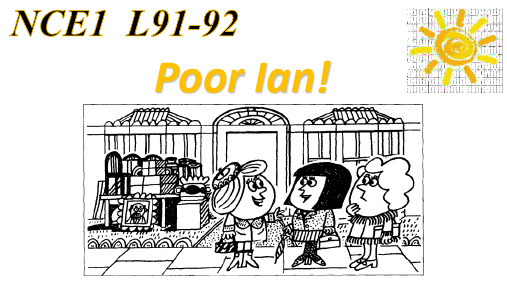
He is going to move into his new house.
move into sp. 搬进...
Ian is going to move out of his old house tomorrow afternoon.
Lily is my next-door neighbour. 隔壁邻居
How many buildings are there in your neighbourhood ?
[ˈneɪbəhʊd]
Exercises: 7B 小题狂做
c. n. 街区,居住区
1. He lives next to us. He is our _n_e_ig_h__b_o_u_r_.
2. v. 移动
What's this ? Look! It can move. 4B U6
Bears move around slowly in the daytime. 8A U5
mo,迁移
move to sp.
move into/ out of sp.
5 Has Ian sold his house yet?
This is Ian .
He has lived in London f_o_r__ twenty years .
He has lived here s_in_c_e_ 1976 .
He has just r_e_ti_re_d_ . He wants to buy a small house in the country .
2. Do you have any supermarkets in your _n_e_i_g_h_b_o_u__rh__o_o_d?
新概念第一册Lesson课堂及课后练习

新概念第一册-Lesson---课堂及课后练习————————————————————————————————作者: ————————————————————————————————日期:新概念一Lesson91~L92 课内语法新课内容:一、单词:拼读、过关、讲解1.still ad.①还,仍旧:He's stillhere.他仍在这里。
(▲still表示仍在继续或仍未发生,位于所表示的情况之前,因此也可在助动词和否定词之前)②([同]even)[修饰比较级]还要,更③尽管如此,可还是:It's rainning,(but)still I'dlike to go.天在下雨,可我还是想去。
2.movevt.①移动,搬动,使改变位置(或姿势):move house 搬家vi.①移动;离开;动身;前进;(下棋)走一子:Don't move,or I'll shoot.不许动,否则就开枪了②迁移;搬家moveto…搬到…eg: Has he moved tohis new house yet? 他已经搬进新居了吗?3.missvt.①未找到;未遇到;未看到:missone's way迷路②想念;怀念;惦记: I'll miss him.我会想念他的。
③发觉……丢失:Imissedmy wallet.我发觉皮夹子丢了。
4.neighbour 邻居eg:Hehas alwaysbeenagoodneighbour.他一直是个好邻居。
5.personn.人;人物eg: He'sa veryniceperson.他是个非常好的人。
people的单复数TheChinesepeople are hardworking and brave.▲泛指“人民”,“人们”时,是单数形式,复数概念;作主语时,与复数动词连用。
▲指“民族”、“(一个国家的)人民”时,可以有单数和复数形式两种6.poor①穷的、贫困的:a poor nation穷国②虚弱的;不足的;笨拙的; ③可怜的,不幸的:PoorIan! 可怜的伊恩!二、词组1、错过做某事miss doing sth2、上周last week3、打算做某事be going to do 4、搬进---moveinto5、后天theday aftertomorrow 6、请代我向他问好please give him my regard s7、tomorrowmorning 明天早上8、Buthis wife did. 但他的妻子要离开。
新概念英语第一册lesson9192

A: When? Tomorrow morning? B: No. Tomorrow afternoon. I’ll miss him. He has always been a good neighbour .
A. No, you won’t B. No, you aren’t.
C. No, please don’t D. No, please.
• 8. – Where is the morning paper?
– I ________ if for you at once.
A. get B. am getting
A. isn’t working
B. doesn’t working
C. isn’t
going to working D. won’t work
3. He _____ very busy this week, he ______free next week.
A. will be; is B. is; is
I will not (won’t) shop. 3.否定句 直接在shall/will 后加not
Will not=won’t
Will you shop? 4.将shall/will提前并大写。(主语是第一人称I 或we时,I 或we变you),句末变问号。
Yes, I will. No, I won’t.
改写句子
1)Tom is going to go hiking.(改否定句)
Tom
going to go hiking.
2)I’ll help them.(改否定句)
新概念英语第一册课后题及答案:Lesson91-92
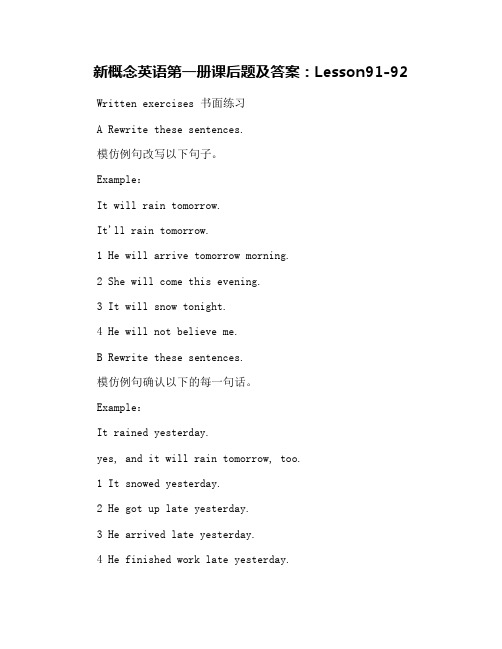
新概念英语第一册课后题及答案:Lesson91-92 Written exercises 书面练习A Rewrite these sentences.模仿例句改写以下句子。
Example:It will rain tomorrow.It'll rain tomorrow.1 He will arrive tomorrow morning.2 She will come this evening.3 It will snow tonight.4 He will not believe me.B Rewrite these sentences.模仿例句确认以下的每一句话。
Example:It rained yesterday.yes, and it will rain tomorrow, too.1 It snowed yesterday.2 He got up late yesterday.3 He arrived late yesterday.4 He finished work late yesterday.5 She drove to London yesterday.6 She telephoned him yesterday.7 He had a shave yesterday.8 She swept the floor yesterday.答案:Lesson 92A1 He'll arrive tomorrow morning.2 She'll come this evening.3 It'll snow tonight.4 He'll not believe me.B1 Yes, and it will snow tomorrow, too.2 Yes, and he will get up late tomorrow, too.3 Yes, and he will arrive late tomorrow, too.4 Yes, and he will finish work late tomorrow, too.5 Yes, and she will drive to London tomorrow, too.6 Yes, and she will telephone him tomorrow, too.7 Yes, and he will have a shave tomorrow, too.8 Yes, and she will sweep the floor tomorrow, too.。
Lesson9192(课件)新概念英语第一册(1)

14. Ask me if Jenny will see Ian today? Will Jenny see Ian today?
He’s going to move tomorrow. be going to do 计划、打算做某事。
I’ll miss him. = I will miss him. I miss home very much. He missed the train yesterday. I miss you because I missed you.
of the room. 他们把课桌移到了房间的左边。
miss /mis/ v. 想念,思念
1)想念,思念 eg. We will miss you if you move.
如果你搬家了,我们会想你的。 I really miss my hometown. 我真的很想念我的家乡。 2)错过 We missed the bus. 我们错过了那辆公车。
• -He didn’t want to leave this house. • -No, he didn’t, but his wife did! 反意疑问句: -He didn’t go to school yesterday, did he? -No, he didn’t.(是的,他没去。)
neighbour /5neib[/ n. 邻居
eg. He and I are neighbours. 他和我是邻居。
neighbourhood 四邻,邻近地区 eg. This is a quiet neighbourhood.
新概念1,U9-12讲解+练习
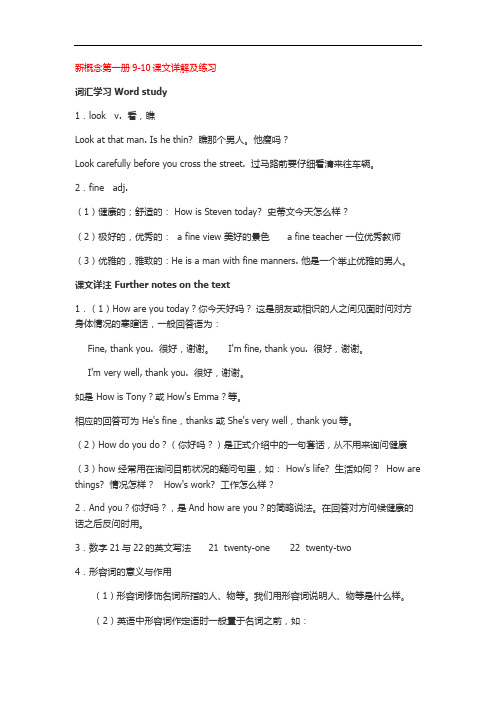
新概念第一册9-10课文详解及练习词汇学习 Word study1.look v. 看,瞧Look at that man. Is he thin? 瞧那个男人。
他瘦吗?Look carefully before you cross the street. 过马路前要仔细看清来往车辆。
2.fine adj.(1)健康的;舒适的: How is Steven today? 史蒂文今天怎么样?(2)极好的,优秀的: a fine view 美好的景色 a fine teacher 一位优秀教师(3)优雅的,雅致的:He is a man with fine manners. 他是一个举止优雅的男人。
课文详注 Further notes on the text1.(1)How are you today?你今天好吗?这是朋友或相识的人之间见面时问对方身体情况的寒暄话,一般回答语为:Fine, thank you. 很好,谢谢。
I'm fine, thank you. 很好,谢谢。
I'm very well, thank you. 很好,谢谢。
如是 How is Tony?或How's Emma?等。
相应的回答可为 He's fine,thanks 或 She's very well,thank you等。
(2)How do you do?(你好吗?)是正式介绍中的一句套话,从不用来询问健康(3)how 经常用在询问目前状况的疑问句里,如: How's life? 生活如何? How are things? 情况怎样? How's work? 工作怎么样?2.And you?你好吗?,是And how are you?的简略说法。
在回答对方问候健康的话之后反问时用。
3.数字21与22的英文写法 21 twenty-one 22 twenty-two4.形容词的意义与作用(1)形容词修饰名词所指的人、物等。
Lesson9192(课件)新概念英语第一册(5)
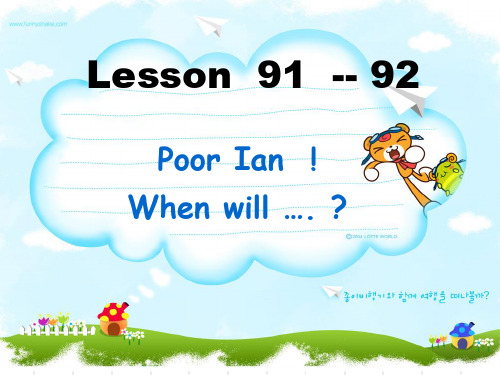
New words and expressions
miss [ mis ] 2)v.注意到……的不在 eg:When did you miss your bag? 你多久之后回来?
New words and expressions
miss [ mis ] 3)v.错过,失去机会 eg:I missed a good chance. 我失去一次机会。 eg:They missed the bus and walk home. 他们没有赶上公汽就走回家了。
person [ `pE:sEn ] n.人 引申词:personal adj. 个人的,私人的 a personal letter 私人信件 a personal conversation 私人谈话
New words and expressions
New words and expressions
neighbour[ `neibE ] n.邻居 eg: He and I are next-door neighbours. 他和我比邻而居。 a good neighbour 好邻居
New words and expressions
poor [ puE ] adj. 2)贫穷的 引申词:rich adj.富有的 a poor man 贫穷的人 a poor village 贫穷的村庄 the poor 穷人(用作复数) eg:We should help the poor. 我们应该帮助穷人。
New words and expressions
move [mu:v ] move to 搬家,移动move in 搬进(强调结果)move into 搬进(强调过程)move out 搬出
New words and expressions
2016新概念第一册 Lesson 19-20 课堂及课后练习
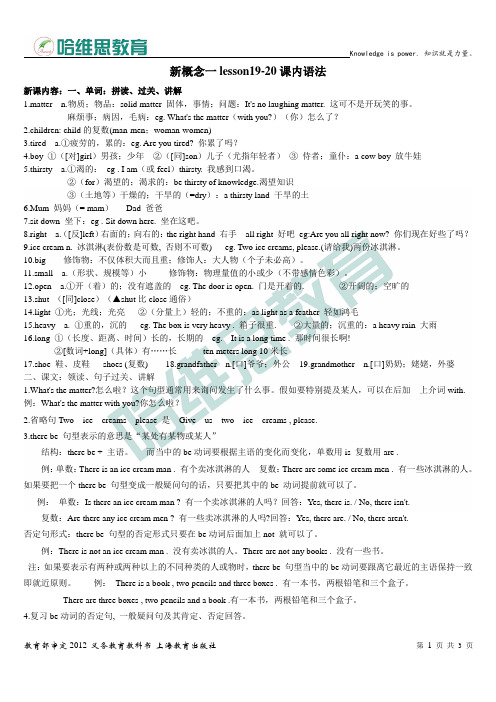
新概念一lesson19-20课内语法新课内容:一、单词:拼读、过关、讲解1.matter n.物质;物品:solid matter 固体,事情;问题:It's no laughing matter. 这可不是开玩笑的事。
麻烦事;病因,毛病:eg. What's the matter(with you?)(你)怎么了?2.children: child的复数(man-men;woman-women)3.tired a.①疲劳的,累的:eg. Are you tired? 你累了吗?4.boy ①([对]girl)男孩;少年②([同]son)儿子(尤指年轻者)③侍者;童仆:a cow boy 放牛娃5.thirsty a.①渴的:eg . I am(或feel)thirsty. 我感到口渴。
②(for)渴望的;渴求的:be thirsty of knowledge.渴望知识③(土地等)干燥的;干旱的(=dry):a thirsty land 干旱的土6.Mum 妈妈(= mam)Dad 爸爸7.sit down 坐下:eg . Sit down here. 坐在这吧。
8.right a.([反]left)右面的;向右的:the right hand 右手all right 好吧eg:Are you all right now? 你们现在好些了吗?9.ice cream n. 冰淇淋(表份数是可数, 否则不可数) eg. Two ice creams, please.(请给我)两份冰淇淋。
10.big 修饰物:不仅体积大而且重;修饰人:大人物(个子未必高)。
11.small a.(形状、规模等)小修饰物:物理量值的小或少(不带感情色彩)。
12.open a.①开(着)的;没有遮盖的eg. The door is open. 门是开着的. ②开阔的;空旷的13.shut ([同]close)(▲shut比close通俗)14.light ①光;光线;光亮②(分量上)轻的;不重的:as light as a feather 轻如鸿毛15.heavy a. ①重的,沉的eg. The box is very heavy . 箱子很重. ②大量的;沉重的:a heavy rain 大雨16.long ①(长度、距离、时间)长的,长期的eg. It is a long time . 那时间很长啊!②[数词+long](具体)有……长ten meters long 10米长17.shoe 鞋、皮鞋shoes (复数) 18.grandfather n.[口]爷爷;外公19.grandmother n.[口]奶奶;姥姥,外婆二、课文:领读、句子过关、讲解1.What's the matter?怎么啦?这个句型通常用来询问发生了什么事。
新概念英语第一册Lesson 91-92 练习题
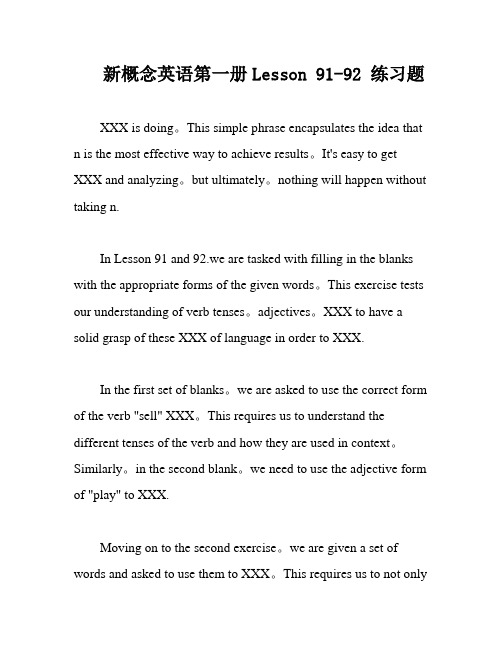
新概念英语第一册Lesson 91-92 练习题XXX is doing。
This simple phrase encapsulates the idea that n is the most effective way to achieve results。
It's easy to get XXX and analyzing。
but ultimately。
nothing will happen without taking n.In Lesson 91 and 92.we are tasked with filling in the blanks with the appropriate forms of the given words。
This exercise tests our understanding of verb tenses。
adjectives。
XXX to have a solid grasp of these XXX of language in order to XXX.In the first set of blanks。
we are asked to use the correct form of the verb "sell" XXX。
This requires us to understand the different tenses of the verb and how they are used in context。
Similarly。
in the second blank。
we need to use the adjective form of "play" to XXX.Moving on to the second exercise。
we are given a set of words and asked to use them to XXX。
新概念第一册Lesson9192课堂重点讲义
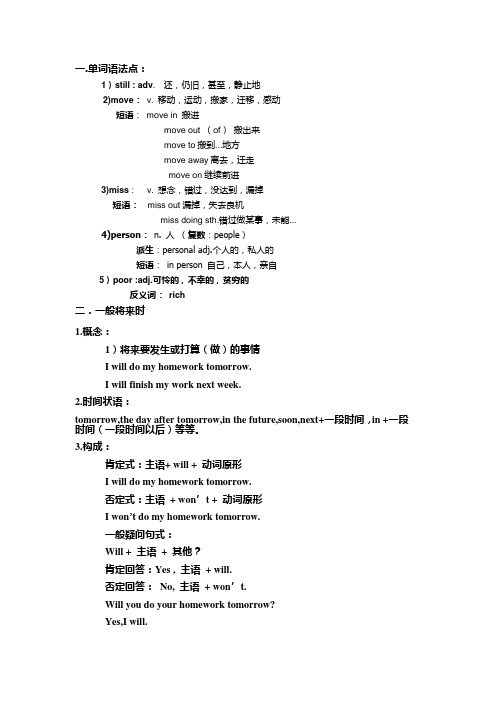
一.单词语法点:1)still : adv. 还,仍旧,甚至,静止地2)move:v. 移动,运动,搬家,迁移,感动短语:move in 搬进move out (of)搬出来move to搬到...地方move away离去,迁走move on继续前进3)miss : v. 想念,错过,没达到,漏掉短语:miss out漏掉,失去良机miss doing sth.错过做某事,未能...4)person:n. 人(复数:people)派生:personal adj.个人的,私人的短语:in person 自己,本人,亲自5)poor :adj.可怜的,不幸的,贫穷的反义词:rich二.一般将来时1.概念:1)将来要发生或打算(做)的事情I will do my homework tomorrow.I will finish my work next week.2.时间状语:tomorrow,the day after tomorrow,in the future,soon,next+一段时间,in +一段时间(一段时间以后)等等。
3.构成:肯定式:主语+ will + 动词原形I will do my homework tomorrow.否定式:主语+ won’t + 动词原形I won’t do my homework tomorrow.一般疑问句式:Will + 主语+ 其他?肯定回答:Yes , 主语+ will.否定回答:No, 主语+ won’t.Will you do your homework tomorrow?Yes,I will.No,I won’t.特殊疑问句式:特殊疑问词+ will +主语+ do +其他?When will you do your homework tomorrow?三.There be 句型及其将来时There be 有~(就近原则)否定:There be not~疑问句:Be there ~将来时:There will be~ 将有~三.反义疑问句1.两大原则:前肯后否,前否后肯前句中有否定词(no, never, hardly, few, little, nothing, nobody, seldom等)时,后句用肯定2.若前句没有be动词,助动词,情态动词,则后句借用do,does,did3.回答按实际情况作答,翻译时yes和no与本意相反四. 课文语法点1. Has Ian sold his house yet? Yes, he has. He sold it last week.现在完成时,标志词yet 过去分词sellsoldsold一般过去时2.Has he moved to his new house yet? No, not yet. He’s still here. He’s going to move tomorrow.现在完成时move to 搬到...not yet简略回答,完整回答是He hasn’t moved to his new house yet.be going to 也可以用来表将来3.I’ll miss him. He has always been a good neighbour.一般将来时will+ 动词原形miss 想念+宾格现在完成时,表示他一直以来都是个好邻居,过去是,现在是,将来也是4.He’s a very nice person. We’ll all miss him.nice形容人品格好all 三者或三者以上,在助动词之后,实义动词之前。
2016新概念第一册Lesson9192课堂及课后练习

新概念一Lesson91~L92 课内语法新课内容:一、单词:拼读、过关、讲解1.still ad.①还,仍旧:He's still here.他仍在这里。
(▲still表示仍在继续或仍未发生,位于所表示的情况之前,因此也可在助动词和否定词之前)②([同]even)[修饰比较级]还要,更③尽管如此,可还是:It's rainning,(but)still I'd like to go.天在下雨,可我还是想去。
2.move vt.①移动,搬动,使改变位置(或姿势):move house 搬家vi.①移动;离开;动身;前进;(下棋)走一子:Don't move, or I'll shoot.不许动,否则就开枪了②迁移;搬家move to…搬到…eg: Has he moved to his new house yet? 他已经搬进新居了吗?3.miss vt.①未找到;未遇到;未看到:miss one's way 迷路②想念;怀念;惦记:I'll miss him.我会想念他的。
③发觉……丢失:I missed my wallet.我发觉皮夹子丢了。
4.neighbour 邻居eg: He has always been a good neighbour.他一直是个好邻居。
5.person n.人;人物eg: He's a very nice person.他是个非常好的人。
people的单复数The Chinese people are hardworking and brave.▲泛指“人民”,“人们”时,是单数形式,复数概念;作主语时,与复数动词连用。
▲指“民族”、“(一个国家的)人民”时,可以有单数和复数形式两种6.poor①穷的、贫困的:a poor nation 穷国②虚弱的;不足的;笨拙的;③可怜的,不幸的:Poor Ian! 可怜的伊恩!二、词组1、错过做某事miss doing sth2、上周last week3、打算做某事be going to do4、搬进---move into5、后天the day after tomorrow6、请代我向他问好please give him my regards7、tomorrow morning 明天早上8、But his wife did. 但他的妻子要离开。
新概念英语第一册Lesson 9192 练习题(无答案)
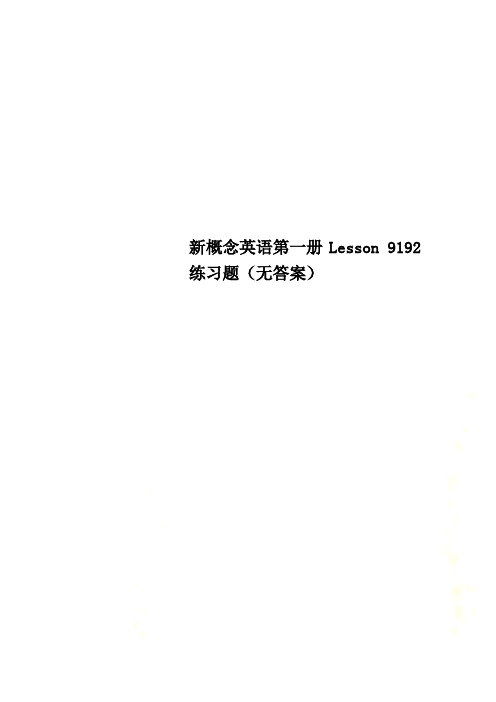
新概念英语第一册Lesson 9192 练习题(无答案)Lesson 91 and Lesson 92一用所给单词的适当形式填空(10分)1. Has Ian ______ (sell) his house yet?2. He is poor in ______ (play) football.3. Please give him my ______ (regard).4. I don’t want to miss ______ (see) that film on TV tonight.5. It will snow ______ (heavy) tomorrow.6. This is a quiet ______ (neighbour) with good shops.7. It’s my ______ (please).8. There were many ______ (person) at the race.9. The house is for ______ (sell).10. What he said is worth ______ (think) of.二用适当的词及所给单词的首字母填空使句意完整(10分)1. It is so wet. When did it r______?2. Ian hasn’t moved to his new house y______.3. They w______ move into this house the day after tomorrow.4. I arrived too late and m______ the train.5. He can’t m______ his legs in the small car.10. He looked for his pen this morning and he ______ (find) it.四 用下列短语的适当形式填空 (10分)1. Don ’t stop. ______. Go on.2. He is not good in Chinese. He ______ it.3. There are many shops ______ the train station.4. Let ’s ______ where to spend our holiday.5. Please ______ my ______ to Ian when you see him.6. I don ’t want to ______ the film on TV tonight.7. Mr. Croft must wait for his turn because he didn ’t ______ with the nurse.8. We have bought the house, but we can ’t ______ until next month.9. We ______ him ______ our helper.10. They are busy ______ because they are leaving for holiday.五 选择填空 (15分)( ) 1. ______ Ian ______ his house yet?Yes, he ______ it last week.regard …as, move along, be poor in, in the neighbourhood of,A.D id, sell; soldB.H as, sold; hasC.H as, sold; soldD.H as, sold; has sold( ) 2. The baby didn’t stop crying ______ his mother came back.A. untilB. afterC. whenD. because( ) 3. When ______ Ian ______ out? Tomorrow afternoon.A. did, moveB. has, movedC. does, moveD. will, move( ) 4. Go down the street until you come to the end of it. Then you can see a white house.You can’t ______ it.A. findB. loseC. missD. watch( ) 5. Please give my ______ to Ian.A. regardB. a regardC. the regardD. regards( ) 6. I think they ______ in the day after tomorrow.A. moveB. movedC. will moveD. have moved( ) 7. Poor Ian didn’t want to leave, but his wife ______.A. willB. didC. hasD. is( ) 8. Where ______ we meet tomorrow everything?A. areB. wouldC. shallD. have( ) 9. We ______ not go there if it rains tomorrow.A. doB. shallC. areD. have( ) 10. Many clouds are coming. It ______ rain.A. willB. isC. is going toD. look like( ) 11. I’m sure there ______ a heavy rain this evening.A. will haveB. is goingC. will beD. is going to( ) 12. What ______ we do then? What about going out for a walk?A. doB. shallC. mustD. did( ) 13. How long ______ he ______ the book?A. has, borrowedB. has keptC. has lentD. is using( ) 14. They ______ basketball yesterday, and they ______ football this afternoon.A. play, playB. play, will playC. played, will playD. played, play( ) 15. Xiao Ming will come and play with me if he ______ busy.A. isB. won’t beC. isn’tD. will be六句型转换(5分)1. They will drive home the day after tomorrow.(就划线部分提问)______ ______ they ______ home?2. Let’s paint this room.(变为疑问句)______ we ______ this room?3. Ian will move away tomorrow afternoon.(就划线部分提问)______ ______ Ian ______ tomorrow afternoon.4. The mechanics will repair my car this afternoon.(变为一般疑问句)______ the mechanics ______ your car his afternoon?5. She will sweep the floor tomorrow.(变为否定句)She ______ ______ the floor tomorrow.七补全对话(10分)A: Look at the ___1___. It’s very heavy!B: Anna, you ___2___ climb the mountain today, I’m ___3___. What ___4___ you do?A: I ___5___ I’ll stay at home and ___6___ some reading.B: Good. It’s better ___7___ do some reading on ___8___ days.A: Ok, I ___9___ go out today. I’ll read some books ___10___ history.1. ______2. ______3. ______4.______ 5. ______6. ______7. ______8. ______9. ______ 10. ______八完形填空(10分)Mike Smith is a six-year-old boy. His father has a shop in the center of a small town. He ___1___ some food in his shop. He’s friendly to the buyers and the food in his shop is ___2___. So people like to buy something there and he’s very ___3___ all the time.It was Mr. Smith’s forty-first birthday yesterday. His wife decided to ___4___ some fish for her husband. As she couldn’t leave his shop and she had to ___5___ in the kitchen. She thought her son could help her. So she told Mike to go to ___6___ some fish. Before the boy went out, she said, “Your dad likes fish alive (活的) , you know. Don’t ___7___ the dead fish home.”“B ut how can I tell the living fish from the dead fish?”“That’s easy, my son,” said the woman. “Put the fish into the water and watch carefully. The living fish can ___8___, but the dead can’t.”“Ok, mum,”the boy said and left. He went outside the town and saw ___9___ famers catching fish in a pool. He put a fish into the pool. And the fish soon went under the water. He was ___10___ and shouted, “Please sell the fish to me, sir!”( ) 1. A. shows B. makes C. does D. sells( ) 2. A. cheap B. expensive C. free D. dirty( ) 3. A. tired B. thirsty C. busy D. hungry( ) 4. A. kill B. fry C. catch D. give( ) 5. A. cook B. rest C. sleep D. play( ) 6. A. borrow B. lend C. buy D. look for( ) 7. A. take B. bring C. drop D. pull( ) 8. A. fly B. walk C. run D. swim( ) 9. A. few B. a few C. little D. a little( ) 10. A. happy B. sad C. strange D. sorry九阅读理解(10分)ATom and Fred are students. They are both twelve years old, and they are in the same class in their school.Last Friday they had a fight in class. Their teacher was very angry. He said to both of them, “Stay here after the lesson this afternoon and write your names one hundred times.”After the last lesson, all the other students went home. But Tom and Fred stayed in their classroom with their teacher. They began to write their names. Then Fred began to cry. The teacher looked at him and said, “Why are you crying, Fred?”“Because his name is Tom May and my name is very long. My name is Frederich Hollingsworth.” Fred said.根据短文内容判断句子正(T)误(F)。
六年级英语自学导读-Lessons 91-92_新概念英语第一册
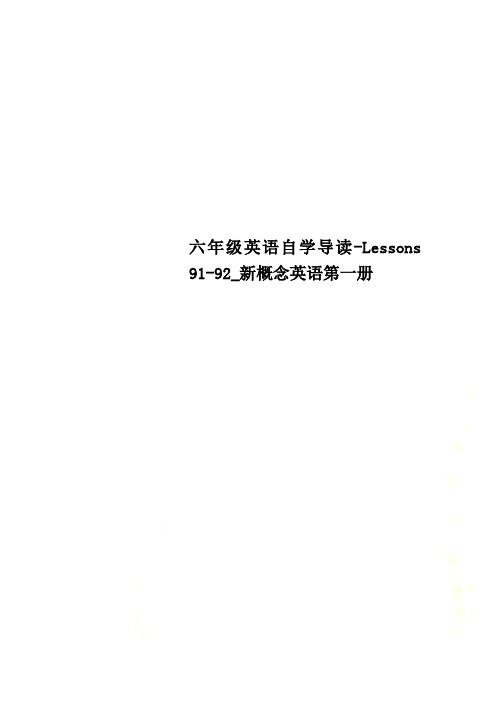
六年级英语自学导读-Lessons 91-92_新概念英语第一册Lessons91~92课文详注Further notes on the text1.We'll all miss him. 我们大家都会想念他的。
all,大家,全部,指3个或3个以上的人或物;指两个用both。
这里的all作we的同位语。
2.…but his wife did.……可是他妻子离开。
句中did代替上文中的wanted to leave。
语法Grammar in use一般将来时(1)一般将来时表示将来某一时刻的动作、状态以及打算。
该时态一般与表示将来意义的时间状语连用,如tomorrow(明天),this month(本月),the day after tomorrow(后天),next week (下周),in two days' time(两天之后),from now on(从现在起),in the future (将来)等。
(2)一般将来时的形式为will/shall+ 动词原形。
will可用于所有人称,但shall仅表示单纯将来时用于第一人称I和we,作为will的一种替代形式。
否定缩写:shan't =shall not, won't =will not:I shan't leave tonight. I'll leave tomorrow.今天夜里我不走。
我将于明天离开。
They won't go to London this weekend.这个周末他们不去伦敦。
1.miss v.(1)想念,惦念:We'll miss you.我们会想念你的。
His mother misses him very much.他母亲很惦念他。
(2)错过;未做到:He overslept and missed his train.他睡过了头,错过了他那班火车。
I missed an opportunity of realizing my dream.我错过了一个可能实现自己梦想的机会。
- 1、下载文档前请自行甄别文档内容的完整性,平台不提供额外的编辑、内容补充、找答案等附加服务。
- 2、"仅部分预览"的文档,不可在线预览部分如存在完整性等问题,可反馈申请退款(可完整预览的文档不适用该条件!)。
- 3、如文档侵犯您的权益,请联系客服反馈,我们会尽快为您处理(人工客服工作时间:9:00-18:30)。
新概念一Lesson91~L92 课内语法新课内容:一、单词:拼读、过关、讲解1.still ad.①还,仍旧:He's still here.他仍在这里。
(▲still表示仍在继续或仍未发生,位于所表示的情况之前,因此也可在助动词和否定词之前)②([同]even)[修饰比较级]还要,更③尽管如此,可还是:It's rainning,(but)still I'd like to go.天在下雨,可我还是想去。
2.move vt.①移动,搬动,使改变位置(或姿势):move house 搬家vi.①移动;离开;动身;前进;(下棋)走一子:Don't move, or I'll shoot.不许动,否则就开枪了②迁移;搬家move to…搬到…eg: Has he moved to his new house yet? 他已经搬进新居了吗?3.miss vt.①未找到;未遇到;未看到:miss one's way 迷路②想念;怀念;惦记:I'll miss him.我会想念他的。
③发觉……丢失:I missed my wallet.我发觉皮夹子丢了。
4.neighbour 邻居eg: He has always been a good neighbour.他一直是个好邻居。
5.person n.人;人物eg: He's a very nice person.他是个非常好的人。
people的单复数The Chinese people are hardworking and brave.▲泛指“人民”,“人们”时,是单数形式,复数概念;作主语时,与复数动词连用。
▲指“民族”、“(一个国家的)人民”时,可以有单数和复数形式两种6.poor①穷的、贫困的:a poor nation 穷国②虚弱的;不足的;笨拙的;③可怜的,不幸的:Poor Ian! 可怜的伊恩!二、词组1、错过做某事miss doing sth2、上周last week3、打算做某事be going to do4、搬进---move into5、后天the day after tomorrow6、请代我向他问好please give him my regards7、tomorrow morning 明天早上8、But his wife did. 但他的妻子要离开。
省略动词部分只留下相对应的情态动词、be动词、助动词三、语法:一般将来时⑴一般将来时表示将来某一时刻的动作、状态以及打算。
该时态一般与表示将来意义的时间状语连用,如tomorrow(明天),this month(本月),the day after tomorrow(后天),next week(下周),in two days' time(两天之后),from now on(从现在起),in the future (将来)等。
⑵一般将来时的形式为will/shall+动词原形will可用于所有人称,但shall仅表示单纯将来时用于第一人称I和we,作为will的一种替代形式。
否定缩写:shan't = shall not, won't = will not:I shan't leave tonight. I'll leave tomorrow. 今天夜里我不走。
我将于明天离开。
They won't go to London this weekend. 这个周末他们不去伦敦。
此外,will除了表示纯粹的将来时间外,还表示说话人的意图和意愿,而shall除了表示将来时间外同时不表示说话人的责任或决心。
⑶除了will/shall外,还可以用其他方法表示将来。
在口语中,be going to比will/shall要为普通,用来表示说话人的意图或打算。
如:She is going to travel by air. 她打算乘飞机旅行。
也可用来表示有迹象某事即将发生。
如:It's going to rain. 将要下雨了。
⑷可与将来时连用的时间短语有:今天:this morning/afternoon/evening 今天上午/下午/晚上tonight今夜明天:tomorrow morning/afternoon/evening明天上午/下午/晚上后天:the day after tomorrow后天the night after next后天夜里其他:in the morning在上午in the afternoon在下午in the evening在晚上课内考核一、单词连线move 邻居neighbour 仍然people 搬家poor 人miss 人们still 贫穷的person 想念二、单选1.She _______ to give me the present, does she?A.wantsB.wantedC.doesn't wantD.won't want2.When will you ________ the book I lent you ?A.returnB.turnC.repayD.interrupt3.We _______to Paris to spend our holiday next year.A.goB.will goC.goneD.went4.I _________my jobs in two days.A.finishB.finishedC.will finishD.finishing5.They _______a car next month.A.buyB.will buyC.boughtD.buying新概念一L91~L92课前测试一、单词:1、还,仍旧2、搬家3、思念4、邻居5、人6、人们7、可怜的8、家务(L55)二、词组:1、搬到某处2、明天上午3、代我向他问好4、后天5、后天晚上6、上周三、用所给动词的正确形式填空1.What will he_____________(do) tomorrow morning?2.We haven't______________(have) lunch now.3.When did he______________(telephone) me yesterday?4.Is your brother____________(write) a letter?5.Don't__________(close) the window.6.He can_____________(go) with me.7.I will______________(leave) here tomorrow.8.They are going___________(move) to London next year.9.She doesn't_____________(like) English at all.10.Have you________________(finish) your homework?四、单项选择1.We_______________miss you very much.A.all, willB.will, allC.will, everyD.every, will2.We'll go to Shanghai the day_____________tomorrow.A.afterB.beforeC.inD.behind3.Have you____________your house yet?A.sellingB.soldC.sellD.selled4.When will the new people move______________this house?A.intoB.ontoC.forD.on5.When did you do it ? I__________________it a moment ago.A.have doneB.am doingC.doneD.did6.He has_________________the window already.A.shutsB.shutC.to shutD.shuting7.Will you see Tom today?____________________.A.Yes, I willB.Yes, I amC.Yes, I will notD.No, I will8.Please give my regards____________________him.A.forB.inC.atD.to9.Has he had his dinner yet ?___________________.A.Yes, he hasn'tB.No, he hasn'tC.Yes, he hadD.No, he didn't10.He drove_______________Tian Jing the day before yesterday.A.inB.onC.toD.at五、翻译:1、你今天能见到伊恩吗?2、他一直是个好邻居。
3、这台自行车多少钱?4、他打算搬到新房去。
5、你已经迁进新居了吗?6、傍晚,孩子们放学回家(L55)。
